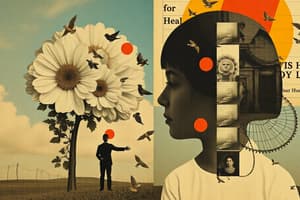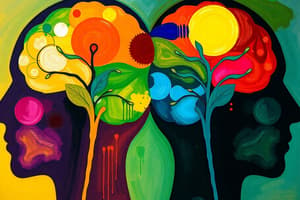Podcast
Questions and Answers
What is the definition of a cohort?
What is the definition of a cohort?
- A group defined by shared economic status.
- A group of individuals born within a few years of one another. (correct)
- A set of individuals experiencing the same life events.
- A community defined by shared cultural beliefs.
Which of the following represents normative age-graded influences?
Which of the following represents normative age-graded influences?
- Going through a major historical event
- Experiencing puberty (correct)
- Winning the lottery
- Marriage in one's teens
What does the term 'non-normative influences' refer to?
What does the term 'non-normative influences' refer to?
- Common societal events predictable by age.
- Biological changes that happen at the same age for everyone.
- Shared experiences within a cultural group.
- Unique events that do not occur in a typical life course. (correct)
What best describes the concept of plasticity in human development?
What best describes the concept of plasticity in human development?
What is cross-sequential research?
What is cross-sequential research?
What does the term 'epigenetics' refer to?
What does the term 'epigenetics' refer to?
Which statement best describes the nature-nurture debate?
Which statement best describes the nature-nurture debate?
What distinguishes a 'critical period' from a 'sensitive period' in development?
What distinguishes a 'critical period' from a 'sensitive period' in development?
How is the concept of multi-contextual development best described?
How is the concept of multi-contextual development best described?
What does the lifespan perspective emphasize about human development?
What does the lifespan perspective emphasize about human development?
Flashcards are hidden until you start studying
Study Notes
Understanding Human Development
- Human development studies how individuals change throughout their lives, considering various ages and conditions.
Nature vs. Nurture
- Nature: Involves genetic influences inherited at conception.
- Nurture: Environmental factors impacting development, including personal experiences.
- Epigenetics: Refers to environmental factors affecting genetic expressions.
- Differential susceptibility: Highlights how experiences vary based on genetic predispositions.
Heredity & Environment
- Human characteristics are influenced by epigenetics, representing the interaction between environmental factors and genetic inheritance.
Life Span Perspective
- Development is multi-directional, changing in numerous ways over time; characterized by both gains and losses.
- Variations in the pace of change exist; development is not strictly linear and can include continuity and discontinuity.
Critical and Sensitive Periods
- Critical periods: Specific times where particular developments are essential for normal growth.
- Sensitive periods: Times when certain developments occur most effectively.
Contextual Influences on Development
- Multi-contextual: Development is impacted by various social contexts - individuals are influenced by their immediate environment and historical background.
- Cohorts: Groups of individuals born within a few years, sharing similar experiences.
Normative Influences
- Normative age-graded: Biological or environmental events affecting groups similarly, like puberty or social events.
- Normative history-graded: Historical events impacting attitudes of those who experience them, such as wars and social movements.
Non-Normative Influences
- Unusual events that influence individual lives, like atypical life experiences occurring at unexpected times (e.g., late puberty, winning the lottery).
Socioeconomic Context
- Socioeconomic status (SES): Influences development through income, education, and neighborhood, intertwined with age and cohort factors.
Cultural Context
- Culture: Shapes behavior and expectations through shared beliefs and social norms.
- Social construction: Understanding based on collective perceptions rather than objective realities.
- Challenges inherent in viewing differences as deficits; promotes respect for various cultures and groups.
Plasticity in Development
- Plasticity: Humans are capable of change; traits can adapt and evolve over time.
- Dynamic systems: Development is a continuous interplay between physical and emotional aspects, and individual environments, including family and society.
Research Methods in Development
- Cross-sectional research: Comparison of different age groups at a single point in time.
- Longitudinal research: Collecting data on the same individuals repeatedly over time.
- Cross-sequential research: Combines both cross-sectional and longitudinal methods to study various age groups over a period.
Studying That Suits You
Use AI to generate personalized quizzes and flashcards to suit your learning preferences.




